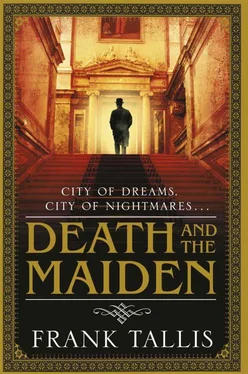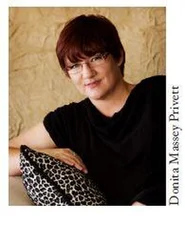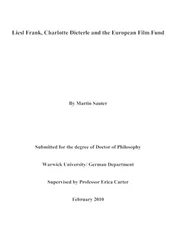Frank Tallis - Death And The Maiden
Здесь есть возможность читать онлайн «Frank Tallis - Death And The Maiden» весь текст электронной книги совершенно бесплатно (целиком полную версию без сокращений). В некоторых случаях можно слушать аудио, скачать через торрент в формате fb2 и присутствует краткое содержание. Жанр: Исторический детектив, на английском языке. Описание произведения, (предисловие) а так же отзывы посетителей доступны на портале библиотеки ЛибКат.
- Название:Death And The Maiden
- Автор:
- Жанр:
- Год:неизвестен
- ISBN:нет данных
- Рейтинг книги:5 / 5. Голосов: 1
-
Избранное:Добавить в избранное
- Отзывы:
-
Ваша оценка:
- 100
- 1
- 2
- 3
- 4
- 5
Death And The Maiden: краткое содержание, описание и аннотация
Предлагаем к чтению аннотацию, описание, краткое содержание или предисловие (зависит от того, что написал сам автор книги «Death And The Maiden»). Если вы не нашли необходимую информацию о книге — напишите в комментариях, мы постараемся отыскать её.
Death And The Maiden — читать онлайн бесплатно полную книгу (весь текст) целиком
Ниже представлен текст книги, разбитый по страницам. Система сохранения места последней прочитанной страницы, позволяет с удобством читать онлайн бесплатно книгу «Death And The Maiden», без необходимости каждый раз заново искать на чём Вы остановились. Поставьте закладку, и сможете в любой момент перейти на страницу, на которой закончили чтение.
Интервал:
Закладка:
Treffen peered at Liebermann and a flicker of recognition appeared in his eyes.
The director continued: ‘I do not wish to humiliate you, Herr Treffen. Nor do I have the slightest desire to make an example of you. All that I want is an orchestra comprised of musicians willing to share my vision, men from whom I can expect, within reason, a measure of loyalty.’ Treffen was about to speak but Mahler raised his hand to silence him. ‘This unsatisfactory situation in which we find ourselves can be resolved, I believe, in a civilised manner without unnecessary embarrassment to all concerned — and I think you know how.’
Treffen moved awkwardly, shifting his weight from one foot to the other. After a protracted silence during which it was evident that his internal deliberations had been both difficult and painful, he said in a strained voice, ‘Herr Director, I wish to tender my resignation.’
‘Accepted,’ said Mahler. He sat back in his chair. ‘I trust you will soon find another position more suitable for a man with your,’ he paused before adding, ‘very particular views.’ The emphasis was heavily ironic.
Treffen turned and marched briskly to the door. His hand had barely made contact with the handle when Mahler called out, ‘One more thing, Herr Treffen. Please inform your co-conspirators that I intend to take no further action. I believe, perhaps wrongly, that they are impressionable young fellows who have had the misfortune to come under your influence. Be that as it may, any more of these,’ Mahler snatched up the letter, ‘and I will not be so forbearing.’
Up until that juncture, Treffen had managed to control his anger; however, the resentment and bitterness that he had been suppressing suddenly found expression.
‘They don’t need your magnanimity!’ Treffen sneered. ‘You think yourself so very superior, don’t you? Touched by greatness! Well, you’re not, by any stretch of the imagination. The old director was twice the conductor you’ll ever be. And as for those symphonies of yours, well, the less said the better! You may think yourself above us all, but really you’re nothing but a pathetic little …’ Treffen collected the bile of his own prejudice in his mouth, savouring its acidity as he prepared to spit out the inevitable unimaginative insult.
‘Don’t spoil things for yourself, Herr Treffen,’ Mahler interjected. ‘I am indeed in a magnanimous frame of mind but, as you know, I am prone to sudden mood swings. This letter,’ Mahler stabbed the sheet of paper with his finger, ‘is slanderous! If you want me to instruct a lawyer then by all means continue.’
Treffen fumed for a few moments, his suppressed rage producing a rash which climbed up his neck and mottled his cheeks. He growled something unintelligible, a throaty curse, and left the office, slamming the door so hard that the window panes rattled.
‘Well, Herr Doctor, that was most satisfying.’ The director produced a broad grin. ‘Thank you so much for your assistance.’
Liebermann inclined his head. ‘I thought you were very lenient, all things considered.’
‘I meant what I said. I have no interest in exacting revenge. Revenge would be just one more distraction and there are too many of those already in my life. At present, there is only one thing that merits my full attention.’ He raised his arms heavenwards. ‘Music.’
Mahler called Przistaupinsky and ordered tea. When the secretary returned, his tray was also laden with two dishes of Marillenknodel — apricot dumplings.
‘Excellent,’ said Mahler.
‘From Cafe Mozart,’ said Przistaupinsky.
Mahler observed Liebermann closely. ‘I take it you like Marillenknodel?’
‘I do.’
‘I am always a little suspicious of those who profess indifference to Marillenknodel — it is beyond my comprehension. My sister Justi has an old recipe which is truly wonderful.’ Mahler said these words with the same conviction he might have used to describe the transcendent beauty of Wagner’s Liebestod . ‘Even so,’ he continued, ‘the chef at Cafe Mozart usually acquits himself well. Wouldn’t you say, Alois?’
‘Indeed, Herr Director.’
Przistaupinsky poured the tea, distributed the plates and served the dumplings. They were golden brown, sprinkled with icing sugar and still steaming slightly. Liebermann sliced through the breadcrumbs with his fork. The exterior broke open, revealing a whole baked apricot inside: the vertical incision and moist interior created a disconcertingly sexual impression.
When Przistaupinsky departed, the two men talked for a time about their victory over Treffen, but in due course the conversation became more general. It was while they were discussing the songs of Alexander Zemlinsky that Liebermann sought Mahler’s opinion with respect to Freimark’s ‘Hope’. The director agreed that it was a remarkable piece of lieder writing and, with some subtle prompting from Liebermann, was soon reflecting on the relationship between Freimark and Brosius.
‘I find early Brosius quite dull, lacking in originality; however, there was a kind of flowering in his middle years, the influence of which I think is detectable in Freimark’s “Hope”. Those poignant discords.’ Mahler tilted his head as if he were listening to the song being performed. ‘But Brosius never continued with his harmonic experiments. After the second string quartet he reverted back to the comfortable, derivative style of his youth. The Rustic Symphony is execrable.’
‘Brahms respected him,’ Liebermann ventured.
‘Well, they were friends — for a period, anyway. Brahms was obliged to be complimentary.’
The talk shifted to a concert series in which the director had programmed Brahms’s Variations on a theme by Haydn . Mahler spoke with passion, slicing the air with his nail-bitten fingers.
‘Brahms takes the seed from the pod and nurses it through all the stages of development to its highest degree of perfection. In fact, he has no rivals in this field, not even Beethoven, whose inventiveness makes him soar into other distant realms. The Andante of my own second symphony and the Blumenstuck from the third are also variations … Rather than a continuous development of the same sequence of notes, mine are decorative arabesques and garlands woven around the theme.’ The director got up from his seat, crossed to the piano and began playing to illustrate his point. ‘Brahms’s variations,’ he continued, ‘are like an enchanted stream, with banks so sure that not a single drop gets lost, even at the sharpest bends.’ Again, he provided an example.
As the director played, Liebermann noticed that a four-hand arrangement of an untitled piece was already on the music stand.
‘What is this?’
‘Oh, something I was working on the summer before last, an Adagietto . It’ll be the slow movement of my fifth symphony.’ Mahler detected Liebermann’s interest. ‘Can you read it?’
‘Yes,’ said Liebermann.
‘Would you like to …’ Mahler wriggled his fingers in the air.
‘Oh, I couldn’t. I mean, not with …’
‘Nonsense,’ Mahler cut in, making a dismissive gesture and urging the young doctor to make room for him on the piano stool. Liebermann could not quite believe his situation. Anxiety made his fingers feel cold and inflexible. He rubbed his hands together to generate some warmth. ‘You may be familiar with some of the material,’ Mahler continued, unaware of his companion’s sudden crisis of confidence. ‘The introductory theme is derived from one of my Ruckert songs. Are you ready?’
Liebermann looked at the notation so closely that the staves began to blur.
Liebermann swallowed and said, ‘Yes.’
Читать дальшеИнтервал:
Закладка:
Похожие книги на «Death And The Maiden»
Представляем Вашему вниманию похожие книги на «Death And The Maiden» списком для выбора. Мы отобрали схожую по названию и смыслу литературу в надежде предоставить читателям больше вариантов отыскать новые, интересные, ещё непрочитанные произведения.
Обсуждение, отзывы о книге «Death And The Maiden» и просто собственные мнения читателей. Оставьте ваши комментарии, напишите, что Вы думаете о произведении, его смысле или главных героях. Укажите что конкретно понравилось, а что нет, и почему Вы так считаете.












